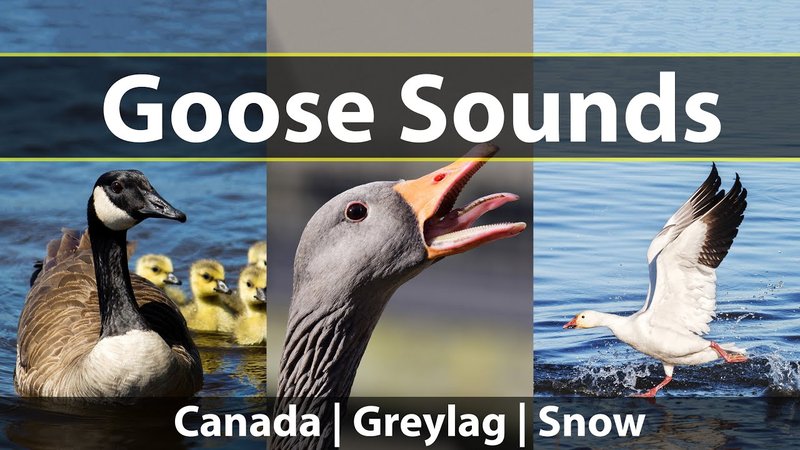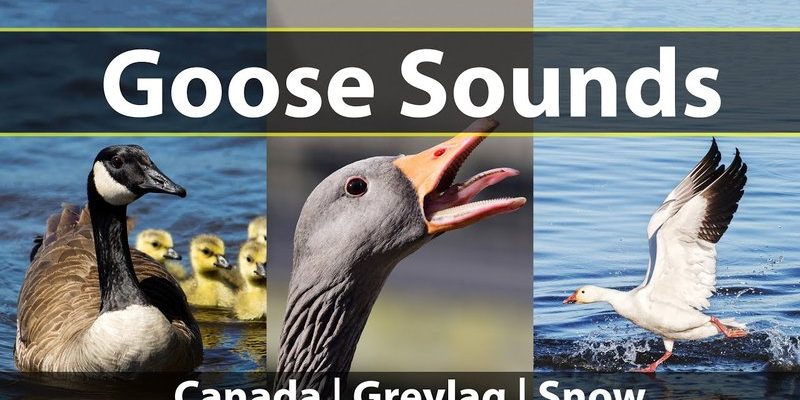
Geese are social creatures, and their vocalizations play a huge role in their behavior, from mating to parenting to alerting each other of danger. Understanding what these vocalizations mean can help you appreciate these birds even more. Whether you’re a bird watcher, a nature lover, or just curious, diving into the world of goose sounds opens up a window into their lives. So, let’s explore the meanings behind those honks and clucks!
Types of Goose Vocalizations
Geese have a variety of sounds they make, each serving a purpose. Let’s break down the most common types:
- Honk: This is probably the most recognizable sound. It’s loud and carries far, often used when they’re flying in formation. Think of it as a way to keep the group together.
- Cluck: When you hear a quick series of clucks, it’s often a sign of excitement or eagerness. This can happen during courtship or when they’ve found a good feeding spot.
- Grunt: Lower, softer sounds usually signify comfort or bonding among geese. It’s like a reassuring murmur when they’re eating or resting together.
- Whistle: A softer, melodic sound that can indicate contentment or playfulness, often heard among goslings and their parents.
Each vocalization has its unique context, which can shift based on the social situation.
Understanding Honking: The Loudest Communication
The honk is synonymous with geese. Imagine being in a group where you need to communicate while flying; you want to ensure everyone stays in sync. That’s where honking comes into play.
Geese use honking primarily during migration. It helps them stay in formation, allowing each bird to know where to be and when to adjust their position. The sound also serves as an alert. If one goose spots danger, honking will get the attention of the others, letting them know to be cautious.
Interestingly, the pitch and intensity of the honk can change depending on what the goose wants to convey. A sharp, aggressive honk can signal alarm, while a softer honk might indicate a friendly greeting. It’s a fine balance of sound and intention, much like how we might change our tone in different conversations.
Clucking: Expressing Excitement and Joy
Clucking is often a more cheerful sound in the goose vocabulary. When a goose clucks, it’s like a little burst of joy. You might hear this during mating rituals or when a flock discovers food.
During courtship, males may cluck to impress females, showcasing their enthusiasm. If you’ve ever seen a couple of geese chasing each other around, those clucks are part of their playful dance of attraction.
This vocalization can also express eagerness. For instance, when it’s time to eat, geese may cluck excitedly to signal to each other that dinner is served. Can you imagine a family gathering where everyone’s excited about the meal? It’s a similar vibe!
Grunting: The Sound of Comfort
Have you ever noticed how some sounds just feel soothing? That’s what grunting is for geese. It’s a low, soft sound that signifies comfort and bonding.
When adult geese are together, they often grunt as they feed or rest. This low murmuring indicates everything is calm and safe. For goslings, hearing their parents grunt can be incredibly reassuring, like a lullaby that checks in on them while they’re busy exploring.
Grunting also serves as a way for geese to communicate closeness. Just like we might talk softly to a friend or loved one, geese use this vocalization to strengthen their bonds within the flock.
Whistling: Playfulness in the Air
Whistling is one of the more delightful sounds you’ll hear from geese, especially among families. When goslings are frolicking around their parents, those melodious whistles echo the feelings of playfulness and contentment.
This sound isn’t as common as honks or clucks, but it has a special charm. It often occurs when young geese feel safe and are enjoying their surroundings. Imagine a sunny day at the park where laughter fills the air—that’s the essence of goose whistling.
Parents might also whistle to get their young ones’ attention or to call them back when they stray too far. It’s a gentle reminder that, even in nature, playtime comes with a side of supervision.
Why Understanding Goose Vocalizations Matters
Grasping the meanings behind goose vocalizations enriches our experience with wildlife. It helps us connect with these creatures on a deeper level. Whether you’re birdwatching, hiking, or just enjoying a day at the park, knowing what those sounds mean can make the experience much more rewarding.
By understanding their communication, we can also become better stewards of their habitats. Awareness of their behaviors can inform conservation efforts, ensuring that they thrive in a changing world.
Moreover, keen observation can lead to fascinating insights. Have you ever noticed how certain sounds resonate differently in different environments? Maybe a honk sounds different over water than in a forest.
Next time you hear a group of geese overhead, stop and listen. Those honks, clucks, and whistles create a beautiful symphony of communication. Each sound carries a message, telling a story of their lives, from migration to family bonding.
Understanding goose vocalizations opens up a whole new world of appreciation for these amazing birds. Honestly, the more we pay attention, the more we realize how intricate nature is. So, whether you’re casually strolling through a park or planning a trip to a wetlands area, keep your ears open. There’s so much happening in the nature around us, and those geese might just be sharing their adventures with you!

